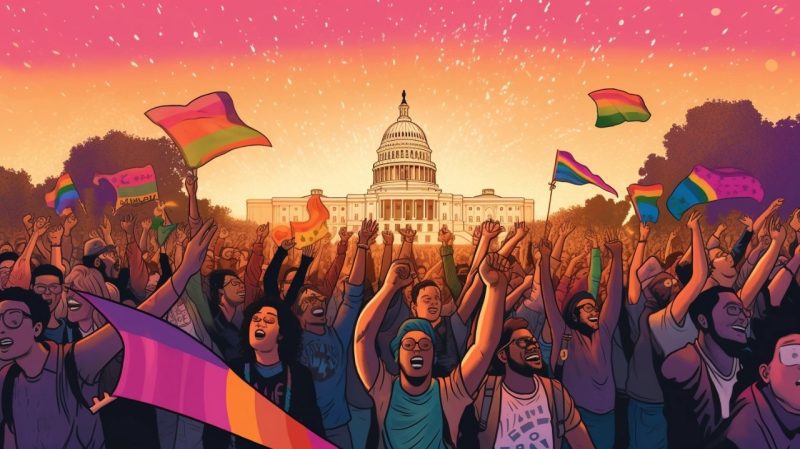
Friday’s decision by the U.S. Supreme Court may have initiated a domino effect that could profoundly impact how businesses approach their services, particularly in light of its ruling favoring a Colorado graphic designer’s refusal to create websites for same-sex weddings.
The contentious 6-3 ruling, centered around the case 303 Creative LLC v. Elenis, leaned heavily on the conservative side of the bench. The majority affirmed that Lorie Smith, a Colorado-based website designer, possesses a 1st Amendment right that permits her to refuse her services for same-sex weddings, disregarding the Colorado law that explicitly prohibits discrimination on the grounds of sexual orientation and other factors. Smith and her legal team from the Alliance Defending Freedom secured the court’s agreement that her dissenting views cannot be suppressed or coerced by the state in the form of a mandated website creation.
Justice Neil Gorsuch, penning the court’s opinion, drew parallels between Smith and speechwriters, painters, and film directors. The ruling posited that, notwithstanding the public nature of Smith’s business, she is fundamentally a “creative professional” who produces “expressive design.”
Arguing further, the court stated that the state’s authority stops short of forcing Smith to create websites for same-sex weddings, just as it would be unreasonable to compel an “unwilling Muslim director” to produce a pro-Zionist film or an atheist painter to illustrate Bible-themed murals.
Gorsuch wrote, “Should the rule state otherwise, the more talented the artist or writer, the easier their voice could be hijacked to spread the government’s preferred narrative. This would not honor the First Amendment; it would mark its downfall.”
However, this ruling did not sit well with the liberals on the bench. Justice Sonia Sotomayor, in her dissent, dubbed the court’s decision as a “permit to discriminate”. She insisted that the court’s verdict could potentially enable businesses to exploit the 1st Amendment as a tool to undermine anti-discrimination laws that are designed to ensure equal service provision to the public.
The cornerstone of Smith’s victory lay in the argument of forced speech. Throughout the oral arguments last December, her counsel, Kristen Waggoner, hammered home the point that Smith was not discriminating against same-sex couples, but rather rejecting the forced endorsement of same-sex marriage via her website designs.
The Supreme Court ruling mirrors this perspective, reinforcing that Smith’s designs are indeed “expressive”, and as such, convey a certain standpoint. The state, according to the ruling, cannot manipulate this stance.
However, the court fell short of providing a clear delineation between standard business services and “expressive designs.” And though this distinction was not critical for this case, it’s clear to see how this verdict may encourage businesses to argue against being forced to provide services that they believe could be interpreted as endorsing viewpoints they are opposed to.
While Waggoner in her brief argued that wedding vendors such as “bartenders, hairstylists, landscapers, plumbers, caterers, tailors, jewelers, and restaurants” do not engage in speech and therefore could not invoke a 1st Amendment right to decline service to same-sex couples, it’s not hard to envision other creative professionals adopting Smith’s argument to refuse services.
The implications of this ruling, however, stretch beyond the issue of same-sex marriage. Colorado and the U.S. Justice Department warned that Smith’s “expressive” stance could pave the way for businesses to discriminate against certain protected classes.
For instance, hypotheticals raised during oral arguments included scenarios where a department store photographer could refuse to photograph Black children with Santa Claus, claiming a particular nostalgic message. On the flip side, questions were raised regarding whether public relations firms or speechwriters could be forced to provide services for clients whose views they oppose.
This controversial ruling, focusing primarily on Smith’s right to refuse expressing a message she opposes, promises to spark future debates regarding which businesses can assert a similar 1st Amendment right, and not solely within the context of same-sex weddings.
Waggoner, in a subsequent email statement, said that the court had established a clear principle: Public accommodations cannot discriminate based on protected characteristics, and the government cannot misuse these laws to force individuals to endorse messages they don’t believe in.
While this decision may seem like a victory for bigots, it undeniably opens up a myriad of challenges and controversies that promise to shake the legal landscape, potentially impacting civil rights, business operations, and personal freedoms. Expect a flurry of future cases trying to navigate the increasingly murky waters between speech and conduct.
